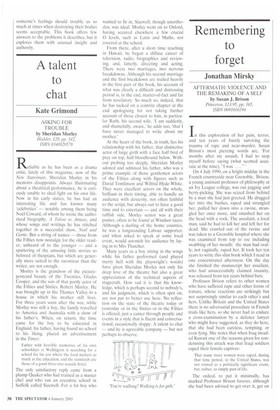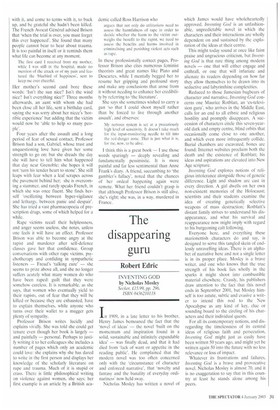Remembering to forget
Jonathan Mirsky
AFTERMATH: VIOLENCE AND THE REMAKING OF A SELF by Susan J. Brison Princeton, £13.95, pp. 165, ISBN 0691016194 In this exploration of her pain, terror, and ten years of barely surviving the trauma of rape and near-murder, Susan Brison's most piercing words are, 'For months after my assault, I had to stop myself before saying (what seemed accurate at the time), "I was On 4 July 1990, on a bright midday in the French countryside near Grenoble, Brison, a young assistant professor of philosophy at an Ivy League college, was out jogging and berry-picking. She was seized from behind by a man she had just greeted. He dragged her into the bushes, raped and strangled her, pulled her down into a ravine, strangled her once more, and smashed her on the head with a rock. The assailant, a local man, said he had to kill her and left her for dead. She crawled out of the ravine and was taken to a Grenoble hospital where she was examined from top to toe including swabbing of her mouth; the man had orally, not vaginally, raped her. It took her ten years to write this slim book which I read in one concentrated afternoon. On the day she finished the manuscript her assailant, who had unsuccessfully claimed insanity, was released from ten years behind bars.
Professor Brison refers to other women who have suffered rape and other forms of torture, whose reactions are strikingly but not surprisingly similar to each other's and hers, Unlike Britain and the United States there is no adversarial procedure in French trials like hers, so she never had to endure a cross-examination by a defence lawyer who might have suggested, as they do here, that she had been careless, tempting, or even lying. She notes that when Iraq invaded Kuwait one of the reasons given for condemning this attack was that Iraqi soldiers raped their female captives: That many more women were raped, during that time period, in the United States, was not viewed as a politically significant event, but, rather, as simply part of life.
The ordeal, to put it minimally, has marked Professor Brison forever, although she had been advised to get over it, get on with it, and come to terms with it, to buck up, and be grateful she hadn't been killed. The French Avocat General advised Brison that 'when the trial is over, you must forget this ever happened'. She found that many people cannot bear to hear about trauma. It is too painful in itself or it reminds them what life can become at any moment.
The first card I received from my mother, while I was still in the hospital, made no mention of the attack or of my pain and featured the 'bluebird of happiness', sent to keep me ever cheerful.
Her mother's second card bore these words: 'Isn't the sun nice? Isn't the wind nice? Isn't everything nice?' Three months afterwards, an aunt with whom she had been close all her life, sent a birthday card, saying she was sorry about her niece's 'horrible experience' but adding that the victim would now be 'able to help so many people'.
Four years after the assault and a long period of fear of sexual contact, Professor Brison had a son, Gabriel, whose trust and unquestioning love have given her some strength to go on; but she dreads the day she will have to tell him what happened that day near Grenoble; she hopes it will not 'turn his tender heart to stone'. She still leaps with fear when a leaf scrapes across the pavement behind her; she is overcoming a stammer, and rarely speaks French, in which she was once fluent. She finds herself 'oscillating between hyper-vigilance and lethargy, between panic and despair'. She has tried a vast pharmacopoeia of prescription drugs, some of which helped for a while.
Rape victims recall their helplessness, and anger seems useless, she notes, unless one feels it will have an effect. Professor Brison was able to become angry at the rapist and murderer after self-defence classes gave her that confidence, Group conversations with other rape victims, psychotherapy and confiding in sympathetic listeners — Freud's 'talking cure' — she seems to prize above all, and she no longer suffers acutely what many women do who have been raped: guilt that they were somehow careless. It is remarkable, as she says, that women who eventually yield to their rapists, out of fear that they will be killed or because they are exhausted, have to explain themselves, while anyone who turns over their wallet to a mugger gets plenty of sympathy.
Professor Brison writes lucidly and explains vividly. She was told she could get tenure even though her book is largely — and painfully — personal. Perhaps to justify writing it to her colleagues she includes a number of pages which only an academic could love: she explains why she has dared to write in the first person and displays her knowledge of the scholarly literature on rape and trauma. Much of it is stupid or crass. There is little philosophical writing on violence against women, she says; her first example is an article by a British aca
demic called Ross Harrison who
argues that not only do utilitarians need to assess the harmfulness of rape in order to decide whether the harm to the victim outweighs the benefit to the rapist, we need to assess the benefits and harms involved in criminalising and punishing violent acts such as rape.
In these professionally correct pages, Professor Brison also cites numerous feminist theorists and great names like Plato and Descartes, while I mentally begged her to resume her gripping and profound story and make any conclusions that arose from it without needing to enhance her credibility by referring to 'the literature'.
She says she sometimes wished to carry a gun 'so that I could shoot myself rather than be forced to live through another assault', and observes:
My nervous system is set at a precariously high level of sensitivity. It doesn't take much for the input-monitoring needle to tilt into the red-danger zone. That is just what it is, for me, now, to be alive.
I think this is a great book — I use those words sparingly — deeply revealing and fundamentally pessimistic. It is more painful and far less sentimental than Anne Frank's diary. A friend, succumbing to 'the gambler's fallacy', noted that the chances of her ordeal happening again were remote. What her friend couldn't grasp is that although Professor Brison is still alive, she's right; she was, in a way, murdered in France,



















































 Previous page
Previous page